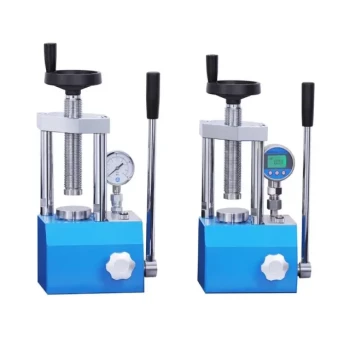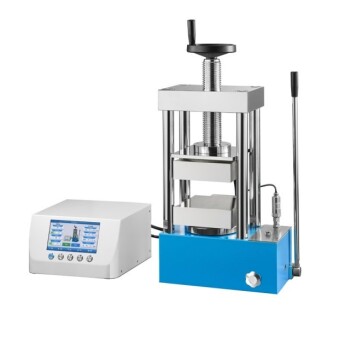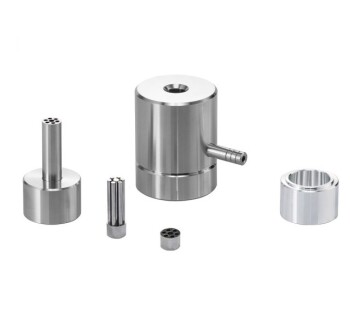In short, the quality of your hydraulic oil is directly tied to the performance, accuracy, and longevity of your laboratory press. This fluid is not merely a lubricant; it is the primary medium for transmitting force, and its condition dictates the reliability of your experimental results and the health of the entire machine.
The hydraulic fluid in your press is not a simple consumable—it is a critical, hard-working component of the system. Treating it as such is the single most important factor in ensuring the precision, power, and long-term value of your investment.

The Core Functions of Hydraulic Oil
To understand why quality is so crucial, you must first recognize the three vital roles the oil plays within the closed system of a laboratory press.
Transmitting Force
The fundamental principle of a hydraulic press is that force is transmitted efficiently through an incompressible fluid. The oil is that fluid. High-quality oil resists compression, ensuring that the force you apply is delivered smoothly and accurately to the sample.
Lubricating Moving Parts
The hydraulic system is filled with precision-engineered components like pumps, valves, and seals. The oil provides a critical lubricating film between these moving parts, preventing friction, reducing wear, and ensuring smooth, predictable operation.
Managing Heat and Contaminants
As the system operates, it generates heat. The hydraulic fluid absorbs and dissipates this heat, preventing components from overheating. Quality oils also contain additives that hold microscopic contaminants in suspension, allowing them to be captured by filters instead of damaging sensitive parts.
The Consequences of Poor Oil Quality
When hydraulic oil degrades, it loses its ability to perform its core functions, leading to tangible and often costly problems.
Loss of Precision and Control
Degraded oil can lead to the formation of sludge and varnish. These deposits can clog the tiny orifices in hydraulic valves, causing them to stick or respond slowly. For a laboratory application that demands precision, this results in inconsistent force application and unreliable test data.
Reduced Efficiency and Power
As oil ages, it can become contaminated with air or water, or its viscosity can break down. This compromises its incompressibility, leading to a "spongy" or sluggish response. The press may struggle to reach its maximum rated force, consuming more energy for less output.
Accelerated Component Wear
Poor lubrication is the fastest way to destroy a hydraulic system. Without a clean, effective oil film, metal-on-metal contact creates friction and heat, leading to premature failure of the pump—the most expensive component in the system.
Corrosion and System Damage
Old oil loses its anti-corrosion properties. Moisture that enters the system can then directly attack metal surfaces, leading to rust and pitting. These corrosion particles then circulate through the system, acting like sandpaper and causing widespread damage.
Key Maintenance Principles to Follow
The claim that hydraulic presses have "minimal maintenance requirements" can be misleading. While they are robust, this reliability is entirely dependent on proper fluid management.
The Myth of "Set It and Forget It"
"Minimal maintenance" does not mean "zero maintenance." The single most important task is monitoring and maintaining the hydraulic fluid. Ignoring the oil is the primary cause of nearly all premature hydraulic press failures.
Visual Signs of Degraded Oil
You don't always need a lab analysis to spot a problem. Be vigilant for key indicators of poor fluid health, such as a milky or cloudy appearance (indicating water contamination) or a dark, burnt smell (indicating thermal breakdown).
The Value of a Regular Schedule
Follow the manufacturer's recommendations for oil changes. This simple, preventative action is far less expensive and disruptive than replacing a failed pump or cylinder. It is the best investment you can make in the machine's longevity.
Making the Right Choice for Your Goal
Proactive fluid management is the key to ensuring your press meets your specific laboratory needs.
- If your primary focus is experimental accuracy and repeatability: Pristine, high-quality oil is non-negotiable to guarantee precise force control and prevent the valve-clogging sludge that ruins data.
- If your primary focus is equipment longevity and cost-effectiveness: A strict schedule of oil analysis and changes is the most critical preventative maintenance you can perform to avoid catastrophic component failure.
- If your primary focus is operational safety and reliability: Using the manufacturer's specified fluid type and maintaining its condition prevents the unpredictable system behavior that can lead to failures.
Ultimately, protecting the quality of your hydraulic oil is how you protect the integrity of your results and the value of your equipment.
Summary Table:
| Aspect | Impact of High-Quality Oil | Risks of Poor Oil |
|---|---|---|
| Force Transmission | Ensures accurate, smooth force delivery | Spongy response, reduced power |
| Lubrication | Reduces wear on pumps and seals | Accelerated component failure |
| Heat Management | Dissipates heat, prevents overheating | Overheating, thermal breakdown |
| Contaminant Control | Suspends particles for filtration | Sludge buildup, clogged valves |
| Corrosion Prevention | Protects metal parts from rust | Corrosion, system damage |
| Experimental Accuracy | Maintains precise force control | Inconsistent results, unreliable data |
Ensure your lab press operates at peak performance with KINTEK's reliable solutions! We specialize in lab press machines, including automatic, isostatic, and heated presses, designed to meet your laboratory's exact needs. By choosing KINTEK, you'll benefit from enhanced precision, extended equipment lifespan, and reduced maintenance costs—perfect for achieving accurate and repeatable experimental results. Don't let hydraulic oil issues compromise your work. Contact us today to learn how our expertise can support your lab's success!
Visual Guide

Related Products
- Automatic Laboratory Hydraulic Press Lab Pellet Press Machine
- Laboratory Hydraulic Press 2T Lab Pellet Press for KBR FTIR
- Laboratory Hydraulic Press Lab Pellet Press Button Battery Press
- Manual Laboratory Hydraulic Press Lab Pellet Press
- Manual Laboratory Hydraulic Pellet Press Lab Hydraulic Press
People Also Ask
- How are hydraulic pellet presses used in educational and industrial settings? Boost Efficiency in Labs and Workshops
- What are the key steps for making good KBr pellets? Master Precision for Flawless FTIR Analysis
- What are the advantages of using a hydraulic press for pellet production? Achieve Consistent, High-Quality Samples
- How are hydraulic presses used in the preparation of powder mixtures? Achieve Precise Compaction for Accurate Analysis
- How do hydraulic pellet presses contribute to material testing and research? Unlock Precision in Sample Prep and Simulation



















